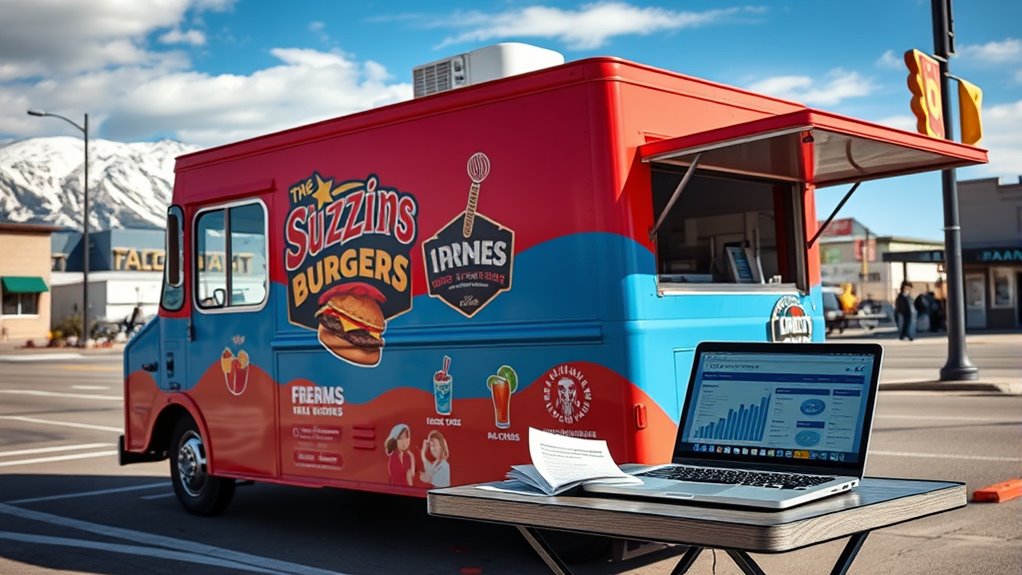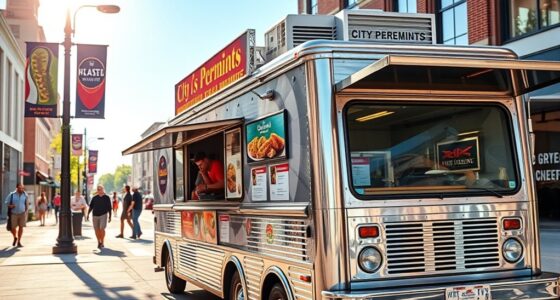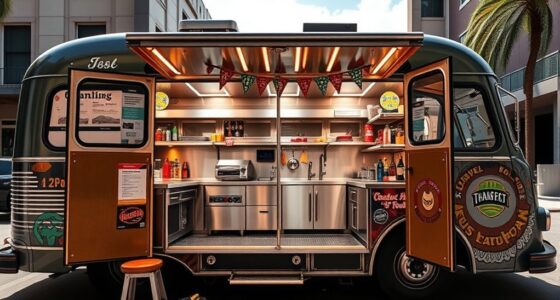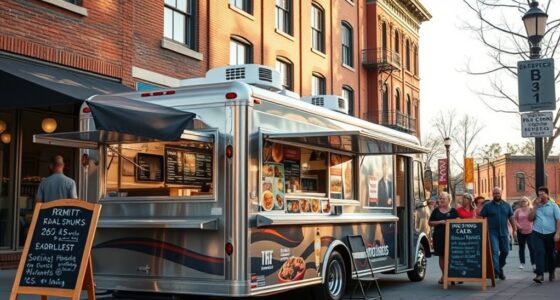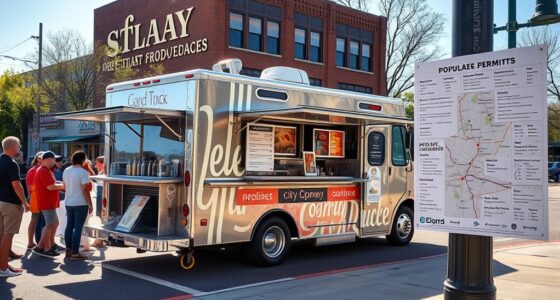To open a food truck in Laramie, you need to secure a city mobile vending license and a mobile food unit permit from the county health department. Costs vary from $50,000 to over $250,000 depending on your setup, with additional expenses for permits, insurance, and equipment. Choose prime spots carefully to comply with local restrictions, and craft a simple, appealing menu. Effective marketing through social media boosts visibility. Keep exploring to uncover more tips for launching your food truck successfully.
Key Takeaways
- Obtain necessary permits including a city mobile vending license, mobile food unit permit, and approvals for public property use.
- Budget $50,000–$250,000 for truck purchase, equipment, permits, insurance, and initial setup costs.
- Choose compliant locations within Laramie, considering zoning, distance restrictions, and permits for parks or events.
- Design your mobile kitchen with smooth, easy-to-clean surfaces, secure equipment, and proper plumbing to meet safety standards.
- Develop a focused menu of 5-12 items and utilize social media marketing with branding to attract and retain customers.
Navigating Permits and Licenses in Laramie
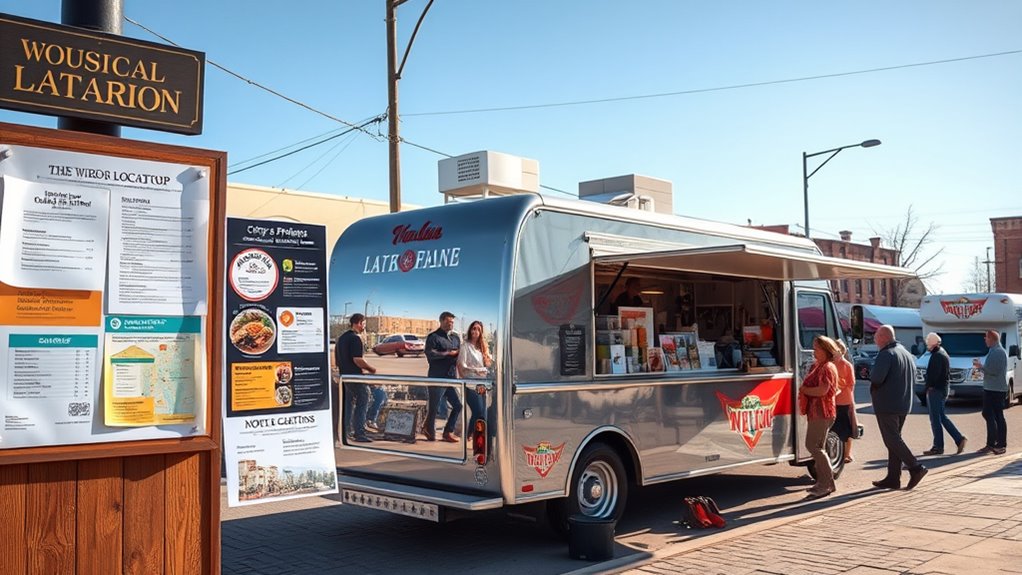
Are you ready to hit the streets with your food truck in Laramie? First, you need a city mobile vending license, which is mandatory to operate within city limits. You’ll need to apply through the city manager’s office or City Clerk’s Division, submitting a completed form, proof of liability insurance, and paying any applicable fees. Remember, without an active license, you can’t vend, and violations can lead to enforcement actions. You might also need additional permits for using public property, like street closures or parking modifications, which require coordination with the Engineering or Traffic Commission. Keep in mind, you’ll also need a mobile food unit permit from Laramie County Environmental Health, plus ensure your unit meets construction, plumbing, and safety standards. Regularly assessing and maintaining your permits is a crucial part of home improvement and ensuring your business remains compliant. Renew your license annually to stay compliant.
Designing a Compliant Mobile Kitchen Setup
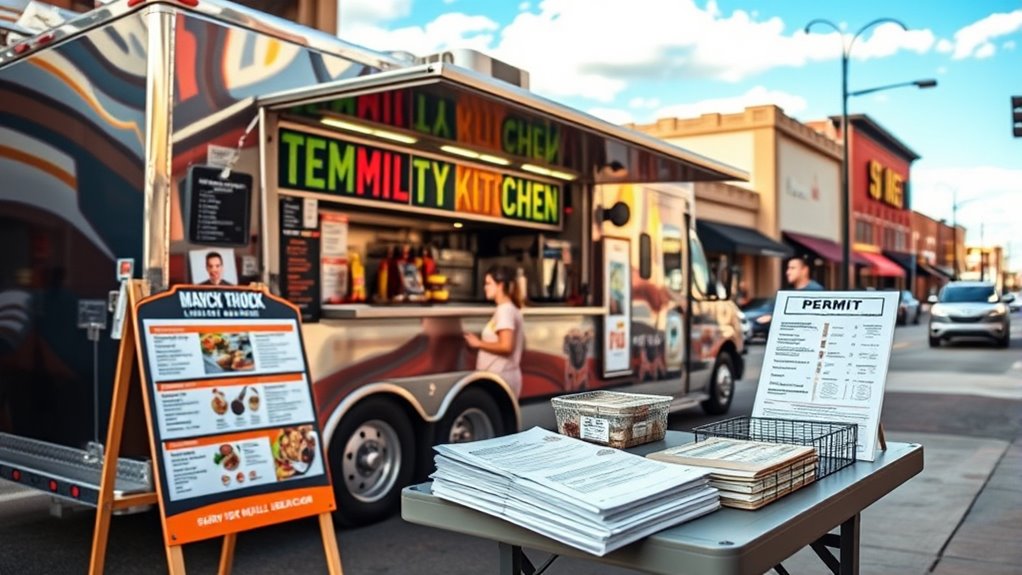
Designing a compliant mobile kitchen setup requires careful attention to construction, finishes, and layout to meet local health and safety standards. You must verify interior surfaces are smooth, non-absorbent, and easy to clean, such as FRP or similar materials. The floor needs to be hard, cleanable, and constructed for sanitation, with sealed seams and joints to prevent pests and ease maintenance. Equipment must be securely mounted to withstand vehicle motion, following NFPA/IFC guidelines for fire safety. Inside, the kitchen layout should respect municipal dimensional limits to ensure compliance. Plumbing requires potable hot and cold water, with appropriately sized tanks for daily use and wastewater disposal at approved sites. Proper ventilation, fire suppression, and electrical systems must meet NFPA standards, ensuring safety and functionality. Regular inspections by local health authorities are essential to maintain compliance and safety standards over time.
Choosing Prime Locations and Operating Restrictions
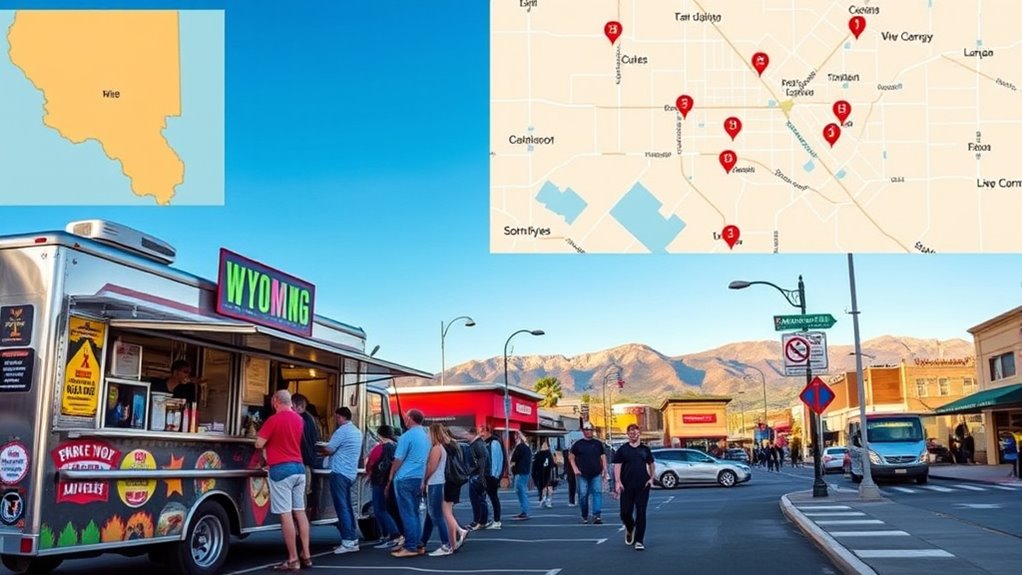
Selecting the right location for your food truck is essential for legal operation and customer access, but it’s important to understand local restrictions and permitting processes. In Laramie, you need a mobile vending license to operate within city limits, and specific zones like commercial parcels, paved parking lots, or private property require approval and compliance with zoning rules. Restrictions may include distance limits from brick-and-mortar restaurants, operating hours, and proximity to pedestrian crossings or fire hydrants. Additionally, understanding local zoning laws can help you identify suitable sites that meet all regulatory requirements for food truck operations.
Be aware of:
- Permits for parks, events, or university sites
- Parking and utility access requirements
- Waste disposal and fire safety regulations
- Location-specific operating hours and route approvals
- The importance of compliance with health codes to ensure smooth operation and avoid penalties.
Budgeting for Equipment, Fees, and Ongoing Expenses
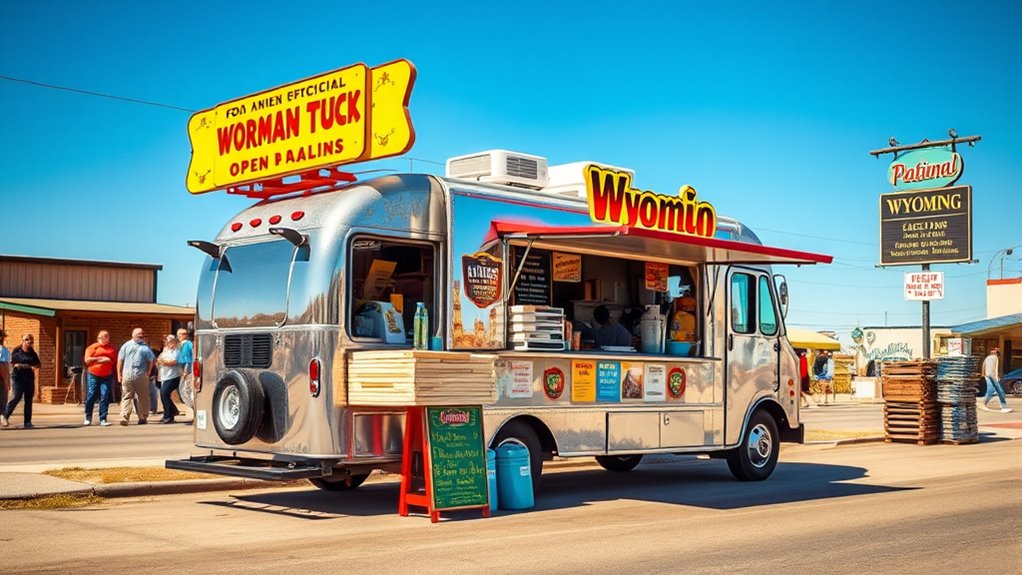
Budgeting for equipment, fees, and ongoing expenses is a critical step in launching your food truck business, as these costs can vary widely based on your choices and market conditions. Expect to spend between $50,000 and $250,000 on a fully equipped truck, with new custom builds costing $75,000–$175,000 and used trucks $40,000–$80,000. You might consider rental options at $2,000–$3,000 per month for market testing. Initial setup costs for wraps, branding, inspections, and registration range from $1,000 to $10,000. Kitchen appliances, smallwares, POS systems, and initial inventory could total $20,000–$70,000. Additionally, permit, license, and regulatory fees can range from $1,800 to over $28,000 in some cases. Understanding local permit requirements is essential to accurately budget for these expenses. It is also wise to account for insurance costs, which can vary depending on coverage and provider, impacting overall expenses. Ongoing monthly expenses include wages, fuel, maintenance, and insurance, totaling several thousand dollars.
Developing a Menu and Effective Marketing Strategies
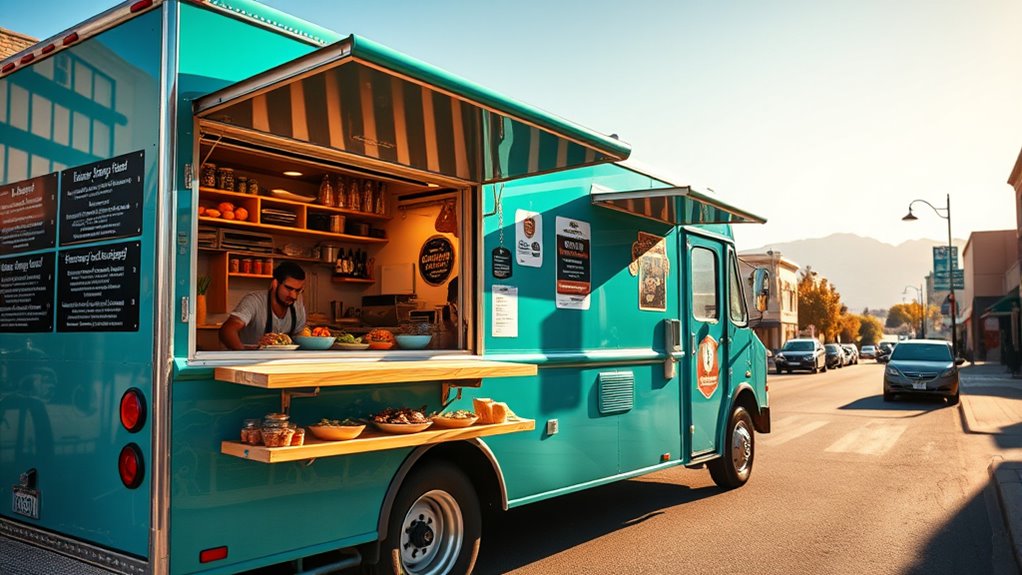
To attract customers and stand out in the competitive food truck scene, developing a focused menu and effective marketing strategies are essential. You should define a clear cuisine focus—like gourmet burgers or vegan bowls—that appeals to your target demographic. Limit your core offerings to 5-12 items to ensure quality, speed, and consistency. Build signature dishes around high-margin items and reuse ingredients across recipes to streamline prep. Price strategically using ingredient costs and highlight add-ons to boost profits. Use visual cues like icons and bright fonts to speed up ordering and make menus easy to scan. Promote signature dishes and limited-time specials on social media to generate excitement and repeat visits. Keep menu design simple and leverage digital menus for quick updates and visually appealing displays. Additionally, implementing clear signage and branding at your truck can reinforce your menu offerings and attract more customers passing by. Incorporating effective branding can also help establish a memorable identity that resonates with your audience and encourages repeat business.
Frequently Asked Questions
How Long Does the Permit Approval Process Typically Take in Laramie?
You’re probably wondering how long permit approval takes in Laramie. Typically, city processing takes about 5–10 business days once you submit a complete application. If your documents are missing or revisions are needed, it can take longer. For health permits and inspections, count on at least two weeks, plus scheduling time, so plan for a few weeks to months overall. Be sure to gather everything upfront to avoid delays.
Are There Specific Noise or Sanitation Limits for Mobile Vendors?
You might think noise and sanitation standards are straightforward, but in Laramie, they’re quite strict. You need to keep noise within city limits, especially near residences, with specific decibel thresholds and operating hours. Sanitation isn’t just about cleanliness; it’s about strict adherence to health codes, including potable water, waste disposal, and food safety. Failure to comply can lead to fines or permit suspension, so pay close attention to these limits.
Can I Operate a Food Truck on Residential Streets in Laramie?
Yes, you can operate a food truck on residential streets in Laramie, but only within certain hours from 7 a.m. to 8 p.m. and if you comply with city rules and zoning laws. You’ll need permits, health and fire inspections, and must follow parking restrictions. Be sure to avoid private property conflicts and obtain any necessary waivers or permissions for street occupation to stay compliant and avoid fines.
What Insurance Coverage Is Required for Food Truck Operations?
You need to have the right insurance coverage for your food truck operations. This includes commercial auto insurance to cover driving-related accidents, general liability insurance for customer injuries and property damage, and business property insurance for equipment and inventory. If you hire employees, workers’ comp is often required. Additionally, proof of insurance, like a certificate, is needed for licenses and permits. Tailor your policies to meet local regulations and your business needs.
Are There Restrictions on Serving Alcohol From a Mobile Food Unit?
You might wonder if there are restrictions on serving alcohol from your mobile food unit. In Laramie, you can’t serve alcohol unless you have the proper permits, like a retail liquor license or alcohol catering permit. Alcohol sales are only allowed where a full food menu is served, and you must follow specific rules about service areas and times. Additionally, proper server training and itemized receipts are often required.
Conclusion
Starting your food truck in Laramie combines the challenge of maneuvering permits with the thrill of serving hungry locals. While permits and costs may seem overwhelming, the vibrant energy of busy streets and enthusiastic customers make it worth every effort. Picture your truck’s bright logo against the Wyoming skyline, blending regulations with opportunity. With preparation and passion, you’ll turn the hustle into a thriving adventure, where compliance meets your culinary dreams on every bustling corner.
